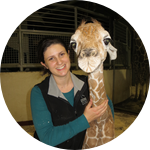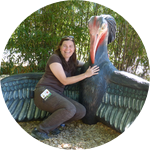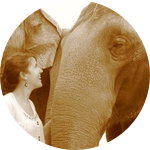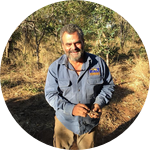Zoos
Categories

A remarkable amount of science happens in zoos – much of it right in front of peoples’ eyes, though they would never know it is there. Zoo practice itself is science-based, and the zoo world is one where research findings are converted to practice surprisingly fast.
The Projects
Browse the participating projects
Fancy footwork: How different are the feet of zoo and wild giraffe?
Cooperative training helps zookeepers care for zoo animals. For giraffe, much of this training focuses on...
How do gorillas see the world?
An animals' "umwelt" is the way in which they perceive the world. With the use of eye-tracking technology...
Help us pioneer stem cell therapy for giraffe!
Arthritis is common in geriatric giraffe. Cheyenne Mountain Zoo is uniquely suited to help find better arthritis...
Evaluating the Nutritional Status in Captive Saddle-billed Storks
Saddle-billed Storks are large, charismatic birds that are rare in captivity. The Dallas Zoo was the first...
Can zoos bring us together?
Have zoos inspired their 180 million annual visitors to get involved and make choices everyday to conserve...
Circulating biomarkers of fibrosis in captive gorillas: a pilot study
Heart disease is the leading cause of death for gorillas in captivity. The ultimate goal of this project...
How does human behavior affect endangered African painted dog behavior?
Highly social with individuals that care for sick, injured, and elderly pack members, African painted dogs...
Who’s there? Oh, it’s you! Vocal recognition in western gorillas
Individually distinct vocalizations allow animals to respond differently based on caller identity, sex...
Lemur Boot Camp! Challenging survival skills for reintroduction
Lemurs are in Trouble. They are the world’s most endangered vertebrates, and attempts to reintroduce captive...
A game changer for primate welfare & conservation attitudes: Free-choice digital enrichment & Human-Animal Interaction
When great apes exert control over their environment their welfare improves, and when zoo visitors have...
More About This Challenge
The sciency details
Challenge Aims
Zoo science occurs in an open forum, where people can be easily engaged in the process and results, and converts to changes in management or animal care rapidly. Zoo science tries to answer big picture questions with limited resources, with goals such as wide-ranging as bolstering endangered populations and understanding why species struggle to reproduce in the wild. Zoo science also often poses these questions to small populations, working with sample sizes that traditional scientists aren’t accustomed to. And to do this, zoo scientists need to be even more rigorous and careful than you would expect, stripping studies down to exactly what is necessary.
Research in zoos is also a fantastic way to engage the public and encourage support for environmental conservation both in captivity and the wild. When zoo patrons see thriving animals in captivity it encourages them to take part in helping the natural world, and when zoo patrons engage with zoo scientists some truly fascinating conversations arise.
We are calling for proposals on any aspect of zoo science, whether that addresses animal behavior, endocrinology, care, or even zoo guest behavior. Projects don’t need to be tied to conservation or management or animal care, but do need to contribute to zoos in some capacity. Projects do need to be conducted at an accredited institution (e.g. AZA, EAZA, ZAA etc.), and we ask that all projects are accompanied by a letter of support from the institutional collaborator. Don’t know if your project qualifies? Contact us to chat, we would be happy to talk about it.
We will review proposals and plan to launch qualifying projects in late October. Projects will have 30 days to fundraise for set “all or nothing” goals. After three weeks of campaigning, the projects with the most backers will receive a bonus amount donated to their campaigns on top of their raised funds.
Project Eligilibity
Any project conducted at an accredited institution is invited, whether it is exploring animal behavior, genetics, endocrinology, or zoo patrons. Please get in touch if you aren’t sure about your idea, by emailing us at support@experiment.com. Interdisciplinary projects are more than welcome, but a significant portion of your project must be conducted at an accredited institution (e.g. AZA, EAZA, ZAA etc.). Researchers must be based out of institutions or organizations in the US, UK, Australia, or Canada (though research can be conducted anywhere), and proposals must be accompanied by a letter of support from the accredited institution you are working with.









 Challenge Grants
Challenge Grants